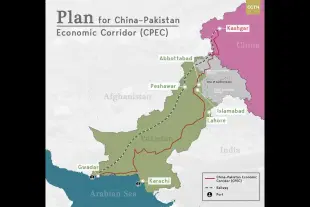News Brief
Pakistan Turns To Asian Development Bank For $2 Billion Loan As China Backs Out Of Flagship CPEC Railway Project: Report
Arjun Brij
Sep 04, 2025, 09:15 AM | Updated 09:15 AM IST
Save & read from anywhere!
Bookmark stories for easy access on any device or the Swarajya app.


Pakistan has turned to the Asian Development Bank (ADB) for funding its largest Belt and Road Initiative project after Beijing backed away from the scheme citing financial and security risks, Nikkei Asia reported.
A senior Pakistani official told Nikkei Asia that the ADB is set to extend a $2 billion loan to finance the upgrade of the 480 km Karachi–Rohri stretch of the Main Line-1 (ML-1) railway.
With an overall cost of $6.7 billion, ML-1 is the single biggest component of the $50 billion China–Pakistan Economic Corridor (CPEC), designed to modernise the 1,726 km track between Karachi and Peshawar.
If approved, the move will mark the first time a core Belt and Road project in Pakistan will be financed by a multilateral lender rather than China.
The ADB loan will come at a floating market rate, unlike the concessional terms Beijing had previously offered under CPEC.
China’s pullback comes amid mounting unease over Pakistan’s $1.5 billion in unpaid dues to Chinese power producers and heightened security risks following the killing of 21 Chinese nationals since 2021.
“When China reviewed the [ML-1] financials, expected returns and Pakistan's problems with [power] payments, it decided against funding the project,” Haroon Sharif, chairman of the Pakistan Regional Economic Forum was quoted as saying by Nikkei Asia.
Experts also pointed to repeated revisions of project costs and designs from $6.8 billion initially to nearly $10 billion in 2022, before being cut back to $6.7 billion as another source of Chinese reluctance.
With the ADB stepping in, the project will involve open bidding and stricter procurement norms, unlike earlier CPEC ventures largely awarded to Chinese contractors.
Please click here to add Swarajya as your preferred and trusted news source on Google
Arjun Brij is an Editorial Associate at Swarajya. He tweets at @arjun_brij




